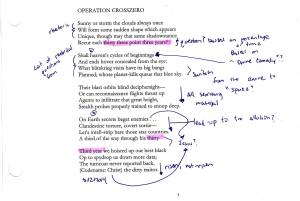
When I was asked to be a contributor to this blog, I said sure with no hesitation. During my MFA days, one of my teachers, Samuel Maio, once told his students that they should study one poet: life and work, to see what can be gained. And ever since I was introduced to Bill Knott by my mentor, Alan Soldofsky, I’ve been trying to read as much of Bill Knott’s work as possible. Recently, I was sent Bill Knott’s “Collected Poetry” — a 456 page massive collection with multiple poems on a page. I haven’t counted out how many poems are in the collected.
Well, let’s just start one page at a time.
“Goodbye”
There’s one poem I thought about when rereading this poem — “When You Grow Old” by William Butler Yeats. Maybe this poem is a response to the Yeat’s poem, maybe not. But now that I have this knowledge, I can only see these poems connected. In Yeats poem there is a separation. The speaker leaves a poem for someone to read which creates a different world for a reader where the reader is loved, “But one man loved the pilgrim soul in you,” which eventually leaves in one form, “how Love fled”.
Now with “Goodbye” there’s the same premise of, “If you are still alive when you read this,” but the change is to stop reading, “close your eyes.” Why is this important. Yeat’s poem is that the words are a trigger of an experience. But with this poem the trigger here is when the reader is devoid of senses.
“I am / under their lids, growing black.” In comparison, Yeat’s black is the devoid of emotion and the reiteration of the loss; meanwhile, in this poem, the “black” has more of a contemporary twist to me — devoid, not so much. The shadow, the subconscious, hate, emotions, whatever. This is what this in which the Yeat’s poem doesn’t — there’s more of an open interpretation to the reader. Yeat’s poem, based around love, uses the emotion as a base — remember my love through my words. This poem is more of “remember me through interpretation,” Whatever a reader wants to believe, just believe.
“Example”
This poem plays with humor and is dependent on the fluctuating line length. The opening line is the conceit, “All my thoughts are the same” and then there’s the question of “same” in what terms, but the humor (the perpendicular approach of what is wanted and what is there) happens with the confirmation of what same refers to, “length–they’re lines.” And here the poem feels like it’s mocking the reader into trying to figure out more, but at the same time, this mock is more of a light jab when the speaker refers to the speaker, “you may protest”
And what is the reader protesting? “that on the page they seem dissimilar / in their duration” again a play on lengths that continue on with the poem, but then the speaker tries to recapitulate and turn the reader’s perspective, “but I swear to all you / unregulated readers-of-prose.” Here is where the speaker slightly brings up the debate that poetry can be “prose just chopped up” and up until this point, the poem does feel too linear, too didactic.
“that in their passage / through my mind / each of these took an equal amount of time.” Selfish. I mean this in the most endearing way. The funny thing of this poem is that the speaker refers to the readers thoughts and structure by being linear as though to backtrack on the initial statement– you think this way, let me tell you reader why it is not what you think — butt the mind of the speaker isn’t so much here. it’s as though the speaker surprises himself through trying to explain himself. So there is a reason after all.
“To a Dead Friend”
This poem is based on seeing things on the other side. The first image is, “mourning clothes worn / inside out / would be white.” The color is arbitrary here — rather the play. What are mourning clothes? Suits, black cloth? When reversed they are the same cloth with this exception — lining. The lining, here, is white which contrasts the exterior. The idea of contrasts is further delved into through the repetition of the “if” question. “if thing were right / if opposites ruled / if truth prevailed” Here this list of if are full of generalities, idealistic ones, or rather the idea of the positive non-descript.
then me and you
would be two
instead of the one
we’ve become
contrasts of expectation. Two seems more of a separation and one is more feels more of a combination in elegiac poem. But here’s the rub, the “two” refers to “me and you” concepts based on existence. But the one here and the other there. It’s a contrast like concepts versus the actual
“[Untitled]”
Here is more of a humorous logical puzzle.
“after the carnival suddenly / mysteriously burnt down they / stirred the fortunteller’s ashes” Wasn’t it Stephen King who wrote, “The road to hell is paved with adverbs.” Well, I guess the burning down of a carnival is a sort of special hell which needs two adverbs to describe it”suddenly” and “mysteriously.” However, these adverbs will add a sense of irony with the last three lines/
“to try to find the reason why / but sadly it seems prophecy / does not work in reversus” hindsight or the more humorous finding the reasons of a past event through a fortune teller. But the core of the poem is the idea that prophecy, if wrong, cannot be explained why its wrong. Or rather, if there’s a concept like a divined plan — why would a fortune teller know the “result” but not the “process”




